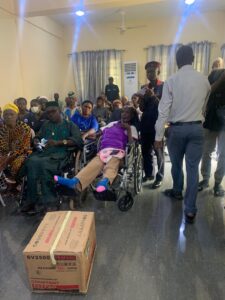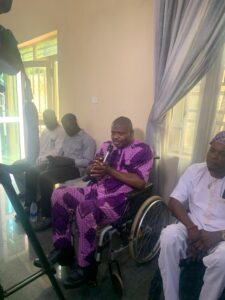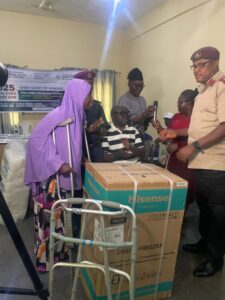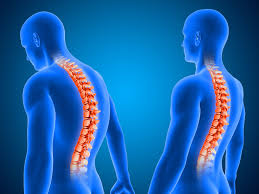By: Yusroh Lawal
At the 2025 Spinal Injury Day event in Abeokuta, Ogun State, survivors of spinal cord injuries share their stories of pain, hope and resilience. From battling economic hardship to finding new purpose in unexpected places, they are grateful for life.

Mr Lasisi Monsuru, who suffered a spinal injury during Ramadan in 2008, said the past 17 years have been filled with struggle. “Getting a job, buying my drugs, even paying my caregiver has been tight. I beg the government to help not just medically, but economically too,” he said.
Mr. Femi Erayetan, injured 21 years ago, found purpose through writing. “I became an author. Two of my books has been approved by Ogun State Government for JSS students,” he proudly shared.
Prince Bola Adeyemi, who had an accident in 2022 as a fresh graduate said he had to abandon physiotherapy due to financial difficulty. “Even the crutches I use were donated after I cried out,” he noted, describing his recovery journey as “draining but hopeful.”

Chairman Urges Public To Prioritise Fall Prevention
Speaking at the event, the Chairman of the Spinal Cord Injuries Association of Nigeria (SCIAN), Ogun State Chapter, Comrade Ayodele Awobona, declared that “disability knows nobody” while urging the public to prioritise fall prevention and spinal health.
Speaking at the event themed “Fall Prevention, Spinal Cord Protection”, Awobona emphasized that spinal cord injuries often occur without warning and cut across all age, gender, and social classes — making awareness and prevention crucial.
The event, held at NMA House, Abeokuta, featured a health talk by former NMA chairman Dr. Kunle Ashimi, and had in attendance the Honourable Commissioner for Women Affairs and Social Development, Hon. Motunrayo Adijat Adeleye, represented by Mrs. Fumilayo Olugana.
Dr. Ashimi, delivering a health talk, disclosed that nearly 30% of spinal cord injury cases stem from avoidable falls, often resulting from slippery floors, uneven surfaces, or unsafe home environments. He urged Nigerians to take fall prevention seriously, especially among vulnerable groups.
To support survivors, representatives from the Central Bank of Nigeria (CBN) donated mobility aids, including wheelchairs, adult diapers, urine pads, clothing, and electric generators, bringing relief to many in attendance.
Some survivors who attended the programme were granted their means of livelihood request, like freezer, generator and so on.

The event served as a powerful reminder of the need to prioritise fall prevention in both public and private spaces while ensuring those already affected by spinal cord injuries receive adequate support, dignity, and access to essential care.

